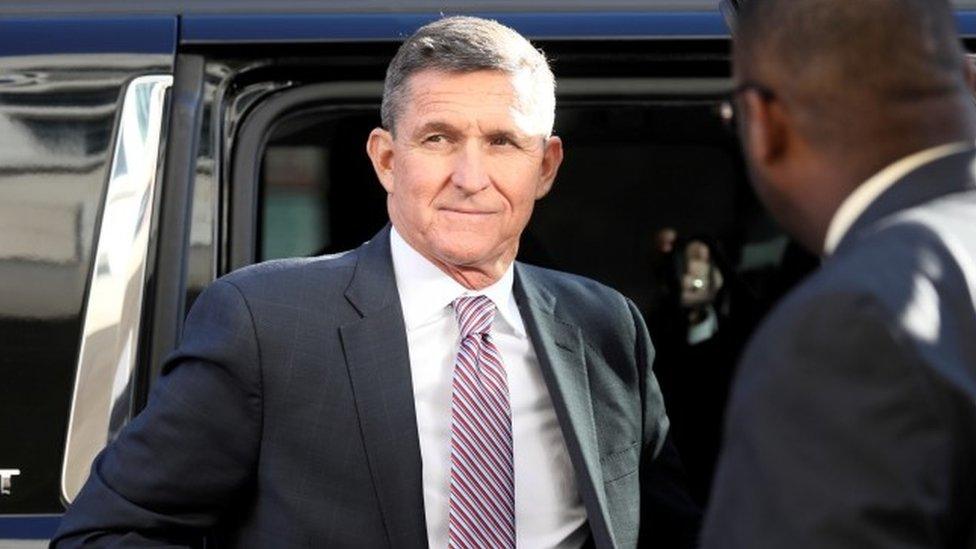Michael Flynn: Trump's pardoned national security adviser
- Published
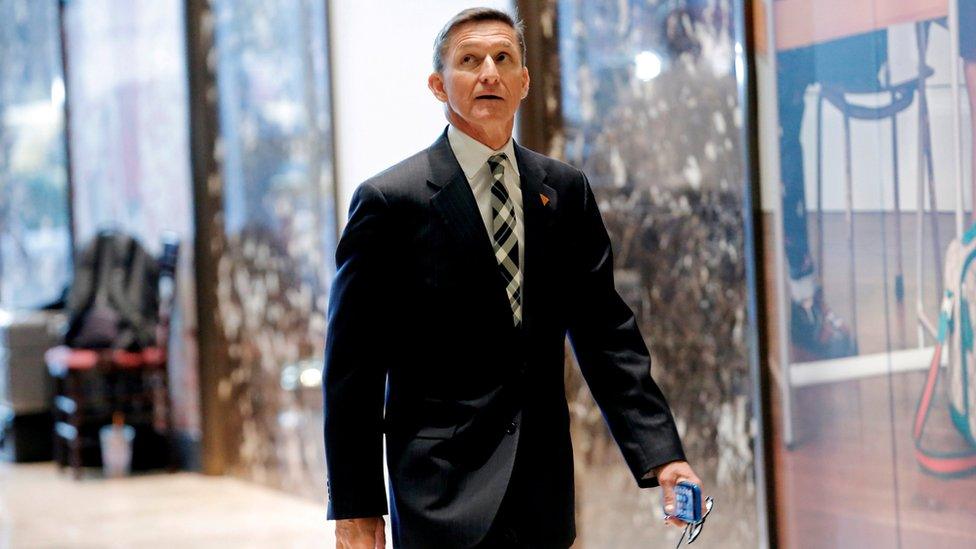
Retired three-star general Michael Flynn is no stranger to controversy
Having been granted a presidential pardon after twice pleading guilty to lying to the FBI about his contacts with Russia, former national security adviser Michael Flynn is the most senior ex-member of President Donald Trump's administration to have found freedom after legal punishment.
A conviction stemming from Special Counsel Robert Mueller's investigation into alleged Russian meddling in the 2016 US election was erased via presidential tweet just days before the Thanksgiving holiday and with two months to go until Mr Trump leaves office.
Mr Flynn's short tenure as national security adviser ended in February 2017 after he spent just 23 days on the job.
He was forced out over revelations that he had discussed lifting US sanctions on Russia with the Russian ambassador to Washington before Mr Trump took office in January - in a breach of government protocols - and that he had lied to the US vice-president about that conversation.
After initially distancing himself from the ex-advisor, Mr Trump later came to embrace him, calling him a victim of the special counsel's "Russia hoax".
After Mr Flynn left the White House the Pentagon launched an investigation into whether he failed to disclose payments from Russian and Turkish lobbyists that he was given for speeches and consulting work.
He also registered with the US government as a "foreign agent" due to his work for the Turkish government.
Guilty plea
In pleading guilty to the charges on 1 December 2017, Mr Flynn admitted that it had been "extraordinarily painful to endure these many months of false accusations of 'treason' and other outrageous acts".
He continued: "Such false accusations are contrary to everything I have ever done and stood for. But I recognise that the actions I acknowledged in court today were wrong, and, through my faith in God, I am working to set things right.
"My guilty plea and agreement to co-operate with the Special Counsel's Office reflect a decision I made in the best interests of my family and of our country. I accept full responsibility for my actions."
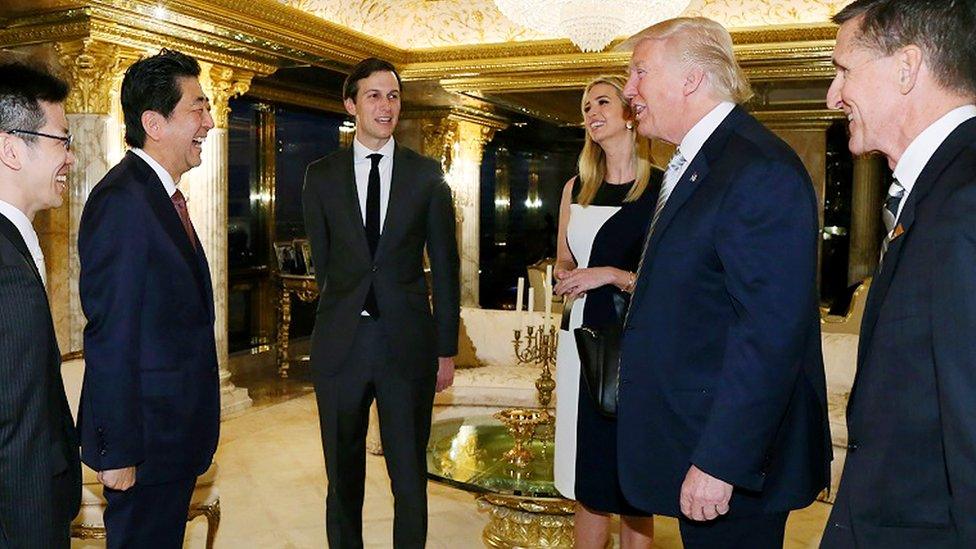
Gen Michael Flynn (R) as Japan PM Shinzo Abe (2nd L) meets US President Donald Trump.
Former President Barack Obama has said that he warned Mr Trump against hiring the former general less than 48 hours after the November election, during a conversation inside the Oval Office.
Mr Flynn earlier in 2017 requested immunity from the congressional committees investigating alleged Russian meddling in the 2016 election, in exchange for his testimony.
"As a former military officer, you simply cannot take money from Russia, Turkey or anybody else," said former Republican Congressman Jason Chaffetz.
"And it appears as if he did take that money. It was inappropriate, and there are repercussions for a violation of law."
Mr Flynn was all but written off in 2014 when he was removed from his post as a Pentagon intelligence chief by Mr Obama.
But the retired US Army three-star lieutenant-general was one of Donald Trump's closest advisers and most ardent supporters during the 2016 campaign.
His importance was underlined just days before his resignation, when he was with the president at his Mar-a-Lago estate in Florida as he hosted his first foreign leader there, then Japanese Prime Minister Shinzo Abe.
In the past, Mr Flynn has complained he was fired from the Defence Intelligence Agency (DIA) in 2014 after just two years for telling hard truths about the war on Islamist extremism.
Mr Flynn said the US is losing a global war against Islamist extremism that could last for generations.
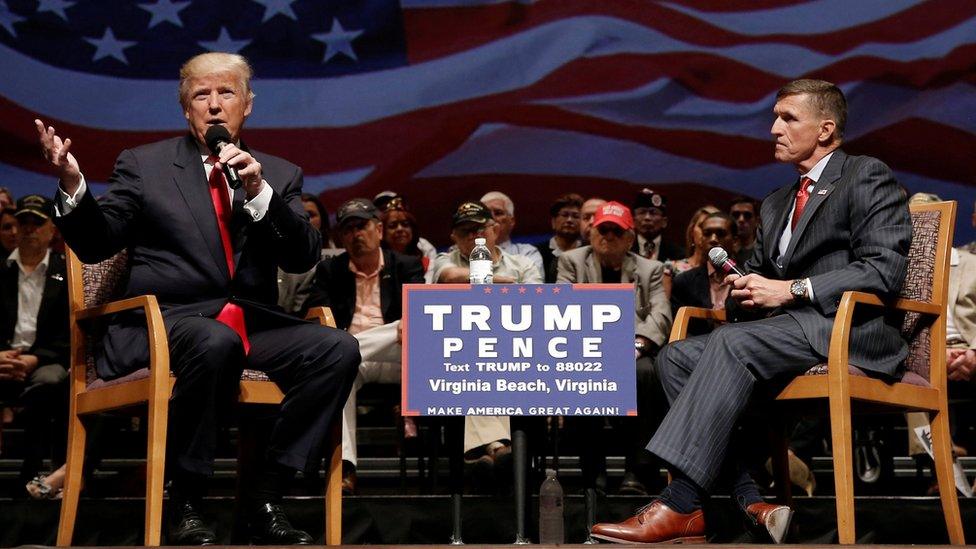
Gen Flynn describes himself as a life-long Democrat, but became one of Donald Trump's closest advisers
But insiders have suggested his exit at the DIA may have been related to his unpopular overhaul of the agency.
Former US officials who worked closely with him described him as extremely smart, though a poor manager.
Indeed, Mr Flynn, a father-of-two who married his high-school sweetheart, went on to become one of the Obama administration's most outspoken critics, all the more surprising as he was a life-long Democrat.
But the Rhode Islander said he no longer recognised the Democrats as the party he once supported.
He instead decided to align himself with Mr Trump, a man whom he rated as a hustler and outsider like himself, part of a larger fight against "the dishonesty and deceit of our government".
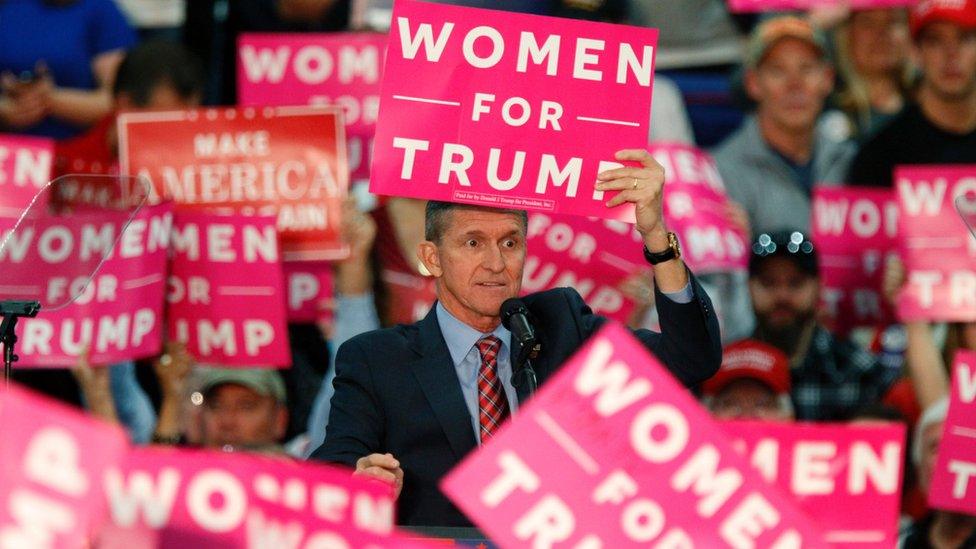
Gen Flynn's supporters praise him for being "a straight shooter"
Mr Flynn was an almost evangelical supporter of Mr Trump.
"We just went through a revolution," he said after the businessman's shock election victory.
"This is probably the biggest election in our nation's history, since bringing on George Washington when he decided not to be a king. That's how important this is."
Mr Flynn and Mr Trump shared many views, including the advantages of closer ties with Russia, renegotiating the Iran deal and combating the threat from Islamic State militants.
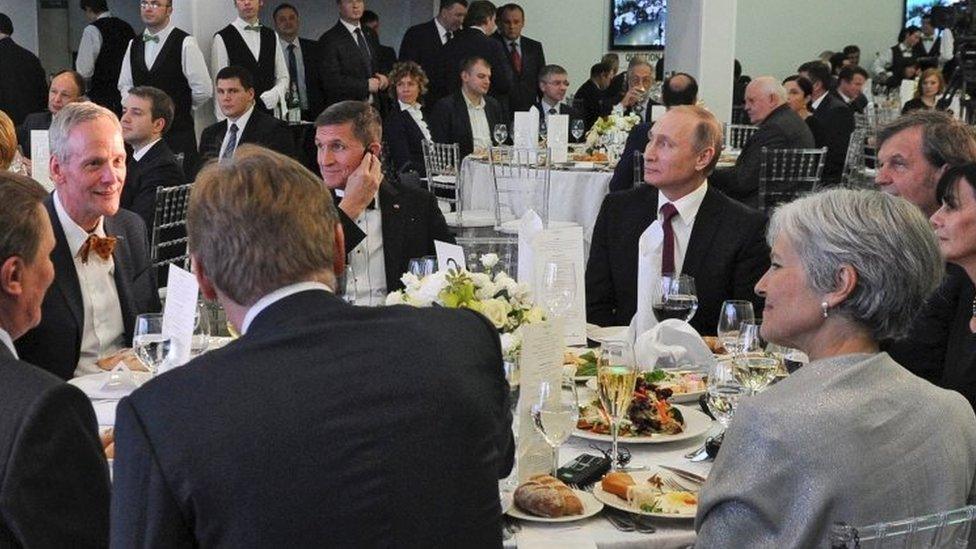
In 2015, Mr Flynn (centre-right) sat next to Russian President Vladimir Putin (centre-right) at a dinner in Moscow
Like Mr Trump, Mr Flynn called the 2003 invasion of Iraq a strategic blunder.
Even the areas where the two disagreed at first were quickly smoothed over.
Mr Flynn's declaration that he was pro-abortion access was quickly reversed, after it sparked outrage among Trump supporters.
And, like Mr Trump, he was no stranger to controversy.
Back during his days at the DIA, he apologised for a presentation which suggested make-up made women "more attractive" and encouraged people to dress for their body shape.
He later said neither he nor the agency "condone this briefing".
In 2015, his appearance at a banquet held in Moscow, where he sat next to Russian President Vladimir Putin, raised eyebrows, with his apparent warmth towards Russia concerning some national security experts.
More controversial yet have been his views on Islam.
In February 2016, he tweeted "fear of Muslims is RATIONAL".
In August, he spoke at an event in Dallas, Texas, for an anti-Islamist group Act for America, saying that Islam "is a political ideology" and that it "definitely hides behind being a religion".
Some expressed concern at how much influence Mr Flynn could wield over a president with little international experience.
But for all his critics, there were those who stood behind Mr Flynn, a man who built a reputation as an astute intelligence professional during his three decades in the US Army.
David Deptula, a retired air force lieutenant general who used to work with him, praised his willingness to "speak truth to power and not politicise his answers".
- Published26 November 2020
